Tokyo’s Buddhist cat temples, Gotokuji & Imado! How to visit the Japanese Maneki neko cats shrines.

Did you know that Tokyo has two temples… dedicated to lucky cats?
At Gotokuji and Imado Shrines, Japanese visitors make prayers and offerings in front of thousands of cat statues!

In this photo diary, I’ll show you both of these very special places, and provide all the travel information you need to visit.
Every cat-lover will be delighted by Gotokuji temple, which has more maneki nekos than you can count.
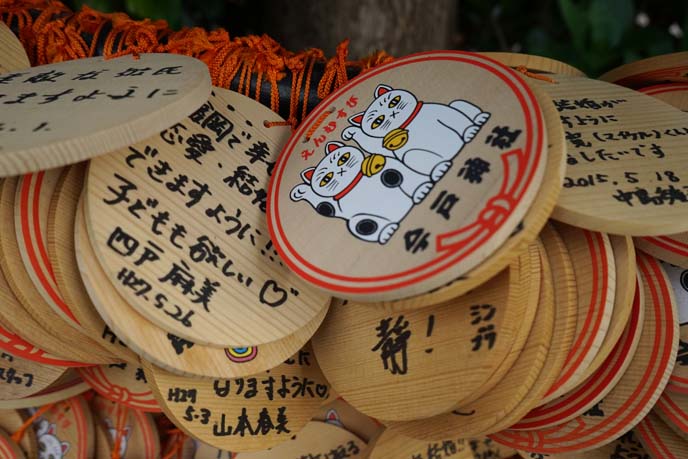
Imado Jinja is just as charming, with a platform where people can bow in front of two giant cat statues.

Both of these temples are dedicated to “maneki neko,” or fortune cat statues. You’ll recognize these kitties above, wearing a red collar with a gold bell, and with one paw raised in the air. (Some statues even have both paws raised, for extra luck!)
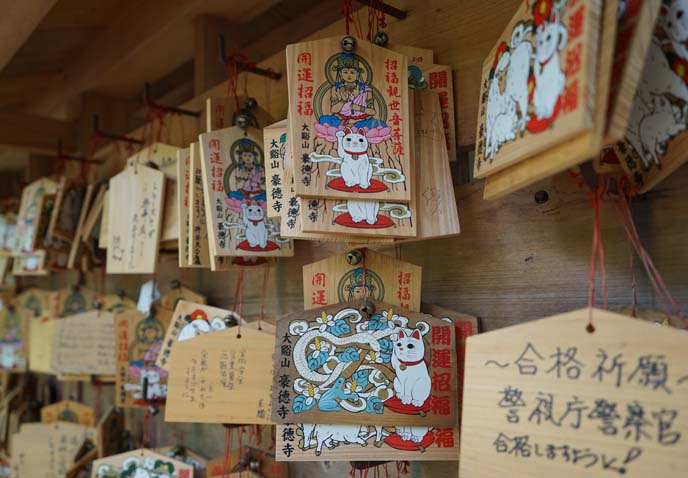
Maneki Neko translates to “beckoning cat” and is a symbol of good luck in Asia. People often place these cat statues or images in their homes or stores, to bring in business, money and other happy things.

Let’s begin our feline-worshipping journey at Gotokuji Temple, which has thousands of identical cat statues in different sizes. The address is: 2-24-7 Gotokuji, Setagaya 154-0021, Tokyo. Generally, the temple is open from morning to late afternoon, but double check the opening hours before you go.
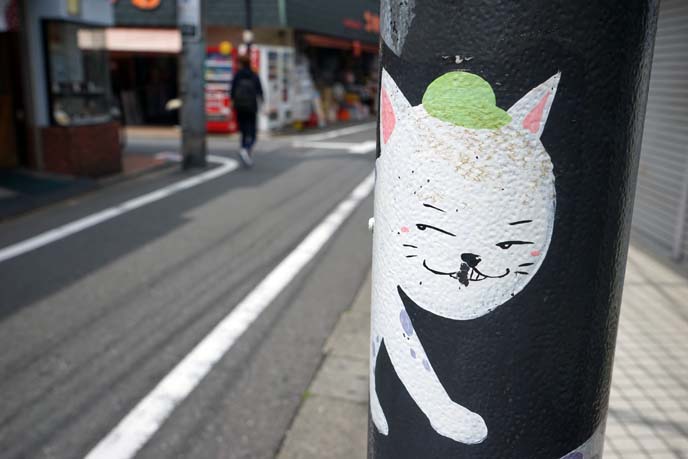
How to get to Gotokuji Cat Temple: From Shibuya, it’s an easy journey by subway. Take the Odakyu Line, get off at Gotokuji station, and walk about 15 minutes.
If you’re visiting destinations all over the country, I highly recommend you pick up a Japan Rail Pass — which lets you travel on any number of JR Shinkansen bullet and local trains, all through Japan! It’s the best deal out there (unlimited 7, 14 or 21 day passes, shipped worldwide to you in 2 days), especially if you’d like to see Hiroshima, Kyoto, Osaka, Nagoya and other cities on your trip. The new JRailPass site also offers VIP train car access, along with itineraries, tips and more.

While you are in the station, I highly recommend connecting to the free WiFi and loading up a Google Map of the address, on your smartphone. The path to Gotokuji Temple is a bit complicated, and I had to walk around the complex before finding the entrance. With a GPS map, the journey is much easier.
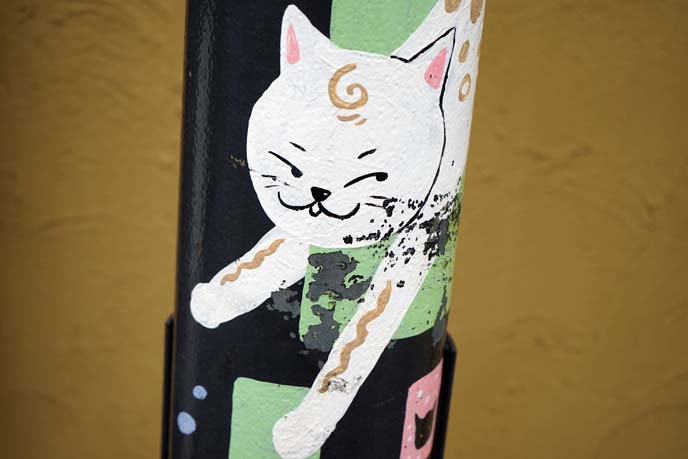
As you walk through Gotokuji’s charming, quiet neighborhood — look out for cat art along the way. These creatures are peeking out at you from lamp posts and flags…

… and seen on posters. There’s even a lucky cat statue right at the subway station exit.
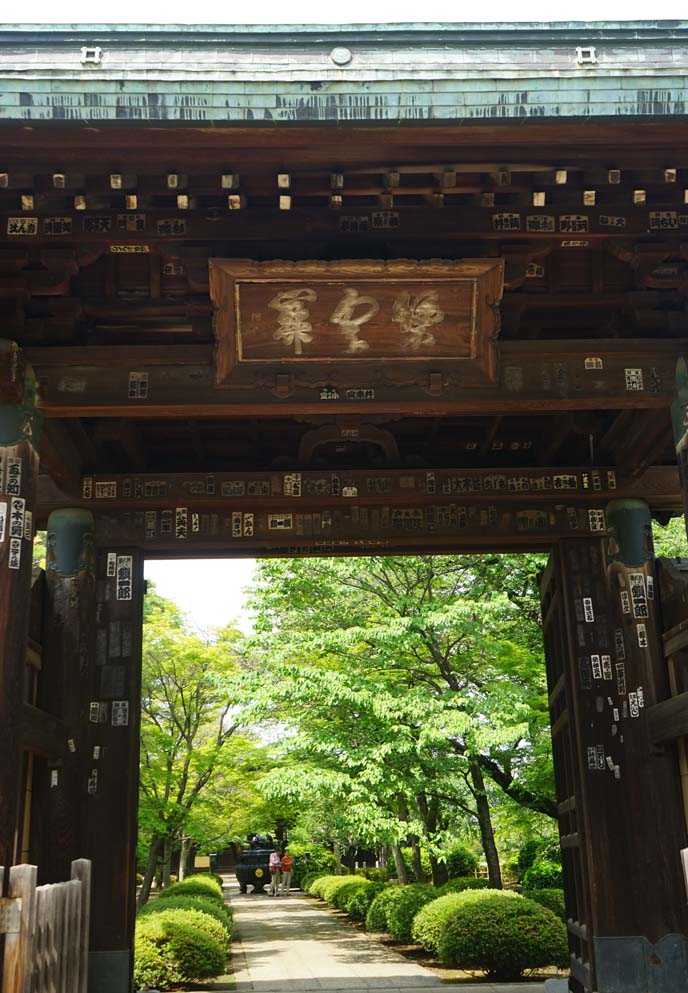
When I arrived at the entrance to Gotokuji temple, I was enchanted by this gate that opens into a peaceful garden path. The temple complex is quite large and filled with greenery, and beautifully maintained.

After going through the Somon front gate, you’ll find the towering pagoda and Butsuden Buddha Hall straight ahead.
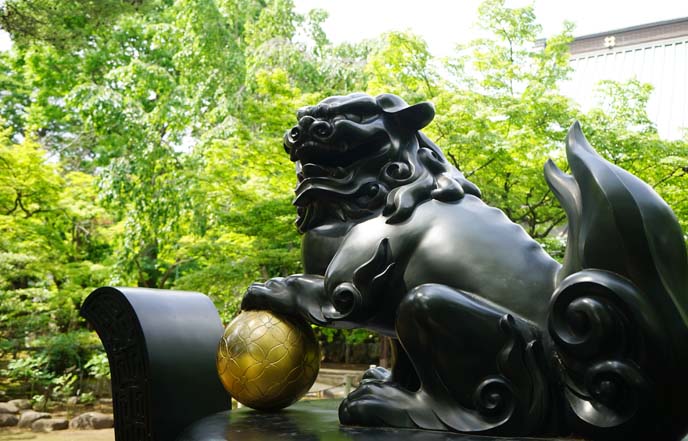
At first, you won’t encounter any cats — the maneki neko statues are further inside. However, the giant incense burner has a lion with a big gold ball under his paw.

The temple also has an old cemetery with family gravestones, which adds to the quiet and reflective tone of Gotokuji.
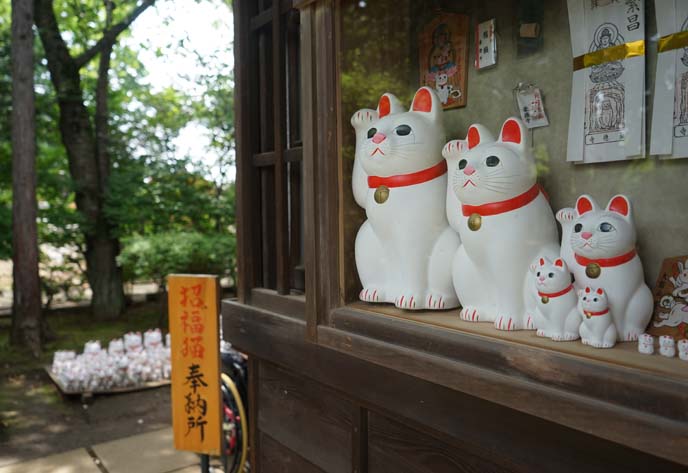
Turn the corner, and you can’t help but smile when you see this family of cats! It looks like a mom and dad, and three children of different ages. All have their right paw raised.

Keep on walking, and you’ll come across this mind-blowing sight. Thousands upon thousands of Japanese cat statues, lined up and facing you!

Cute as they are, these kitties are not toys. Visitors treat the cat statues with reverence, and refrain from touching them. Since the shrine is outdoors, the bodies get a little muddied at times, but the groundskeepers clean and replace them regularly.

What’s the origin story of the Maneki Neko? There are quite a few legends, but one of the most popular ones dates back to the Edo period. A daimyo (feudal lord in Japan) was passing by a temple, when a cat raised his paw and beckoned him to enter. The daimyo followed him inside, and suddenly a powerful thunderstorm broke. Thankful that the cat saved him, the lord rebuilt the temple that is now Gotokuji.

Another version says that the Lord Ii Naotaka was doing falconry, and on his way back home when it started raining hard. He huddled under a tree near a temple, and then noticed a cat raising his paw. Naotaka went over to the cat… just in time, as lightning struck the tree that he had been standing under. Grateful, the lord became the benefactor of the temple.

Regardless of the historical truth, maneki nekos (and cats in general) have been tied to good fortune and the supernatural in Japan. Since Gotokuji is dedicated specifically to these cats, people make offerings here as a sign of gratitude when their wishes come true.

The cat stories are part of Japanese legends and folklore, rather than Buddhism or Shinto in particular. However, the cats fit right in since they are an important symbol in Japanese culture, and a way of giving thanks and strengthening intention.
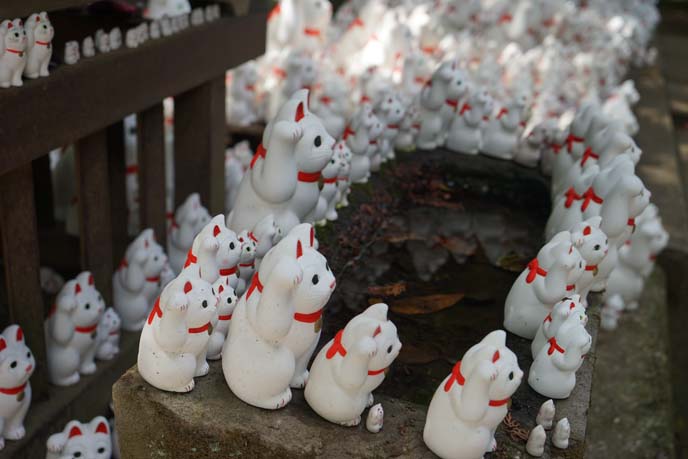
Some visitors purchase one of these cat statues to take home. After the maneki neko has delivered with good fortune, they bring back the statue and add it to the shrine’s collection.
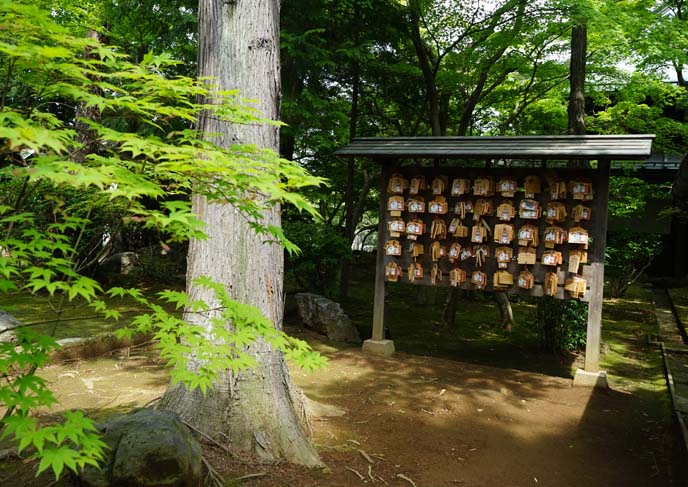
Shinto devotees also write out wishes on ema (豪徳寺), or small wooden plaques decorated with images from the temple.

The ema prayer boards or votive tablets are then hung up near the shrine, for the Shinto kami (spirits) to receive them.

At Gotokuji, the boards are painted with cats and Buddhas, with their right arms raised. The wishes written on the back might be for good health, overcoming challenges or anything at all.
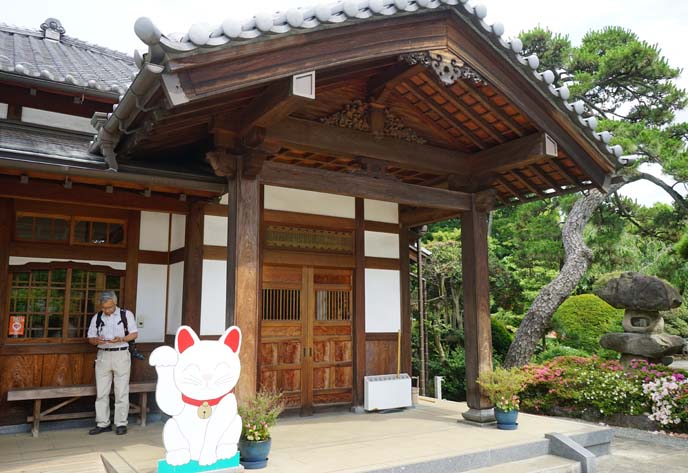
At the gift store, you can purchase these prayer boards and cat statues of all sizes (these are the exact same ones found in the shrine). I bought a medium maneki neko to take home, and a prayer board to hang on my door. The proceeds support the temple, so it’s for a great cause.

Even though the legend of the beckoning cat goes back many centuries, these “maneki neko” statues probably only date back to the 18th century in Japan.

Nowadays, these cats are popular all over Asia, especially in Hong Kong and China. The beckoning cat is also the official mascot (Hiko-nyan) of Hikone in Shiga Prefecture, since that is the district that Ii Naotaka ruled.
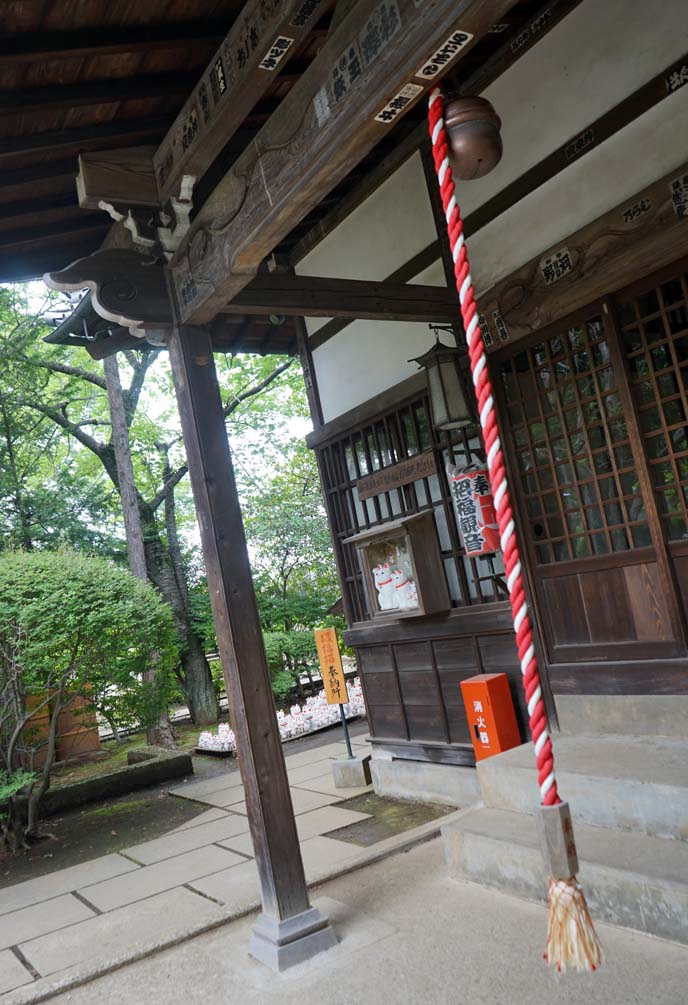
Gotokuji visitors can also pull this long red rope and ring the bell, which looks like the one worn on the cat’s collar. Called a “suzu,” these bells bring in the good spirits (kami) and repel the evil ones.
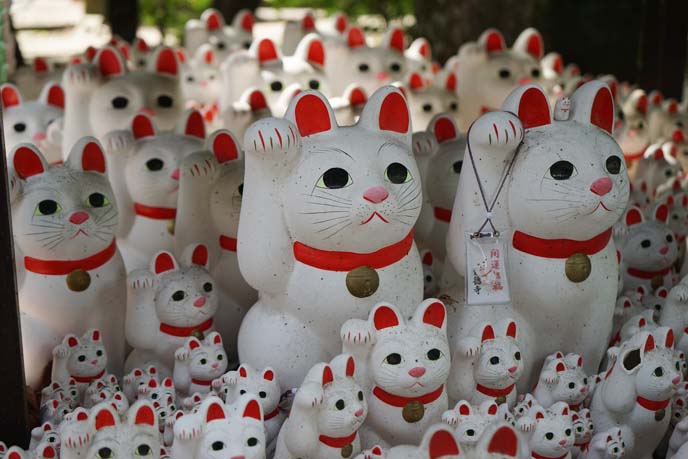
Gotokuji Temple is not often visited by tourists, making it a lovely and unique place for contemplation.
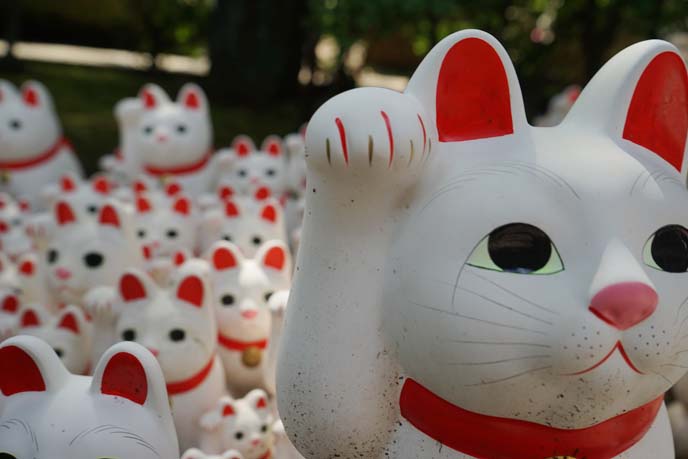
If you’re a cat-lady, or simply interested in the fascinating spiritual culture and folklore of Japan, you must go to Gotokuji Temple.
But wait — there’s another location for cat-worship in Japan…

Imado Shrine in Asakusa! Here, you can make offerings and prayers in front of two giant cat statues: one white, and one with black spots.

When you approach the stand, it looks like these two cats are greeting you with fist-pumps in the air!
Now, how to get to Imado Jinja? The address is 1-5-22 Imado, Taito 111-0024, Tokyo. If you take a taxi, the address in Japanese is : 今戸神社 Japan, 〒111-0024 東京都台東区 今戸1丁目5−22

Imado Shrine is a bit of a walk from Asakusa subway station, but on the plus side, you can make this a day trip and visit the famous Senso-ji temple as well. Take the Toei Asakusa or Ginza subway line, and don’t get off at Akasaka station by mistake! Once again, I suggest connecting to the free WiFi when you arrive (such as from 7-Eleven), and mapping out your route to Imado.
And likewise, double-check the opening hours as the temple usually closes by the early evening.

After navigating the crowd of tourists at Sens0-ji, and going through several small streets, you’ll find this little-known temple built in 1063. These two maneki nekos are here to welcome you. The male on the left is Nagi-kun, and has patterns. His mate is the white female Nami-chan.
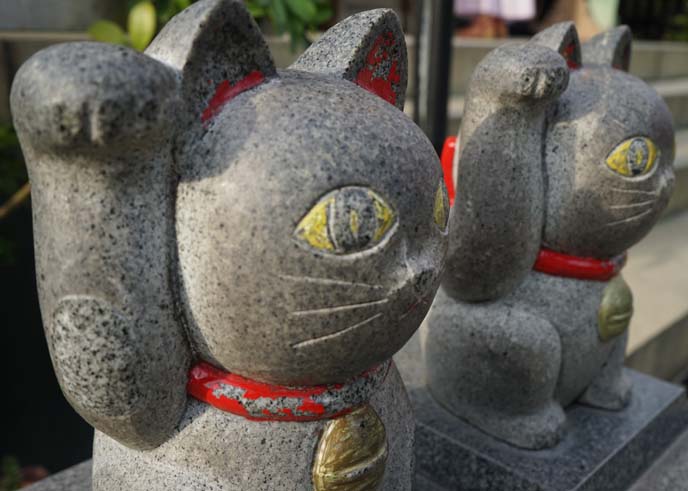
Imado Shrine isn’t as large as Gotokuji, and has fewer statues of “lucky cats”. However, they have a larger variety of cats, mostly in pairs. I enjoyed visiting both equally, as they were special in their own ways.
I have many more photos to show you from these temples, so keep on reading below…
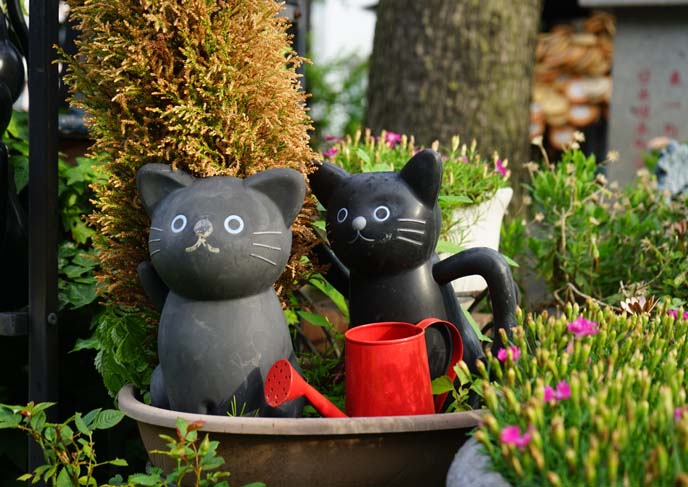
Next to the Imado Shinto platform, there is a whimsical garden full of cats!

These kittens are actually watering cans, and peep out from the flowers and leaves.

I preferred the Imado gift shop, since there was greater variety. The little stall had these unique ceramic figures of the two cats in love, called Imado-yaki. Note that their mouths are an X, like my beloved bunny character Miffy!

Imado also sells these round ema, or Shinto wooden plaques for prayers. They offer fold-out art, satchels with good luck papers, charms and other goods in different colors. Any purchase is a donation to the shrine, and brings good “feng shui” as we’d say in Hong Kong.

Imado Shrine is located in what is probably the birthplace of the maneki neko statue. In the Edo period, talented potters lived in this neighborhood, and made a type of pottery called Imado ware. Some of the earliest versions of maneki neko were made right there.

In fact, there is still a ceramic shop on the premises — run by the same family for the past 150 years.

Visitors can take part in the Shinto ritual of writing out your wishes on a piece of paper, and tying it to a rack for the spirits to receive.

You can also walk up to the shrine, bow, offer incense, and ring the suzu bell.

And once again, you can write your wishes, hopes and dreams onto these wooden plaques, or ema.

Looks like there are a lot of wishes for the kami to read! The boards feature the two mascot cats, either with paws raised or dressed as Japanese emperor and empress.

This is a little description of Nami and Nagi, the male and female couple.

I purchased two ema of each type, and hung them up at home — one on either side of my bed.

The x-shaped mouth on these cats is adorable. (Reminds me of Miffy the bunny.)

If this shrine is too cat-tastic for you… look for a funny fanged dog statue, guarding the racks of prayer boards!

Now, let’s go back to Gotokuji for a moment — since the cats are not the only attraction there.
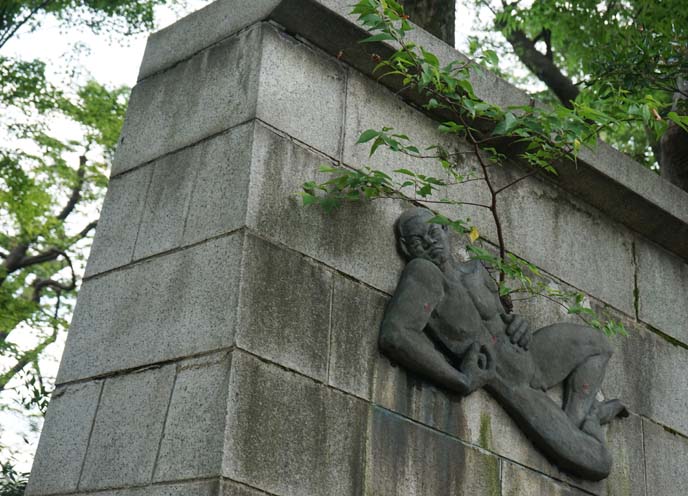
I loved walking through the tranquil, Buddhist graveyard. There are tombstones of all types, and the designs have merged with nature over time.
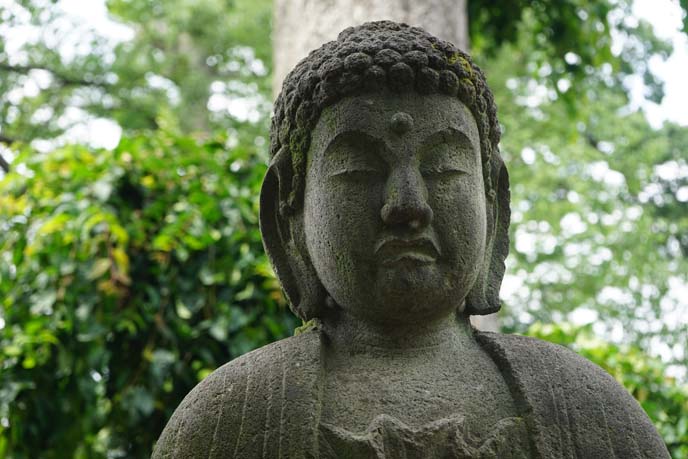
Gotokuji Temple is the burial ground of over 300 lords, including many family members from the Ii Clan of Hikone Castle in Shiga Prefecture (which is connected to the beckoning cat tale).
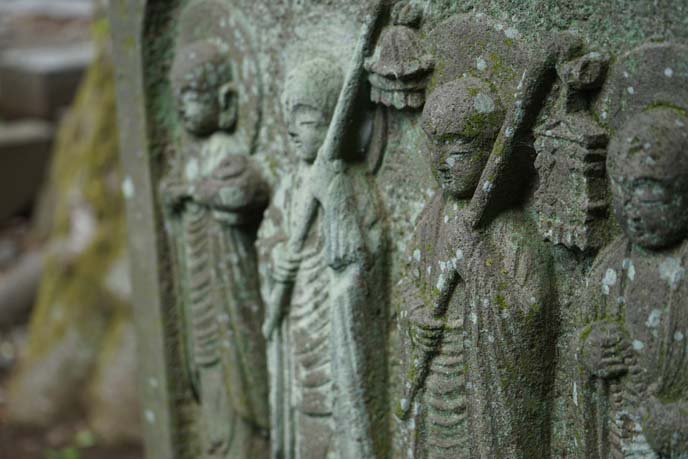
The cemetery holds the grave of Lord Ii Naosuke (1815-1860), who supposedly encountered a cat who saved him from being struck by lightning.
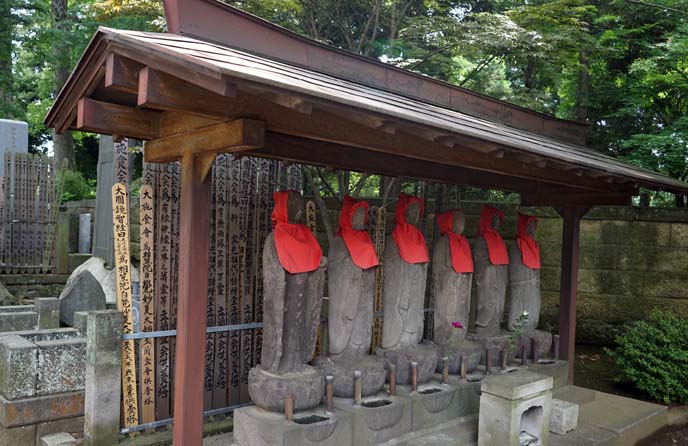
The cemetery is a fascinating mix of folk and Buddhist iconography.
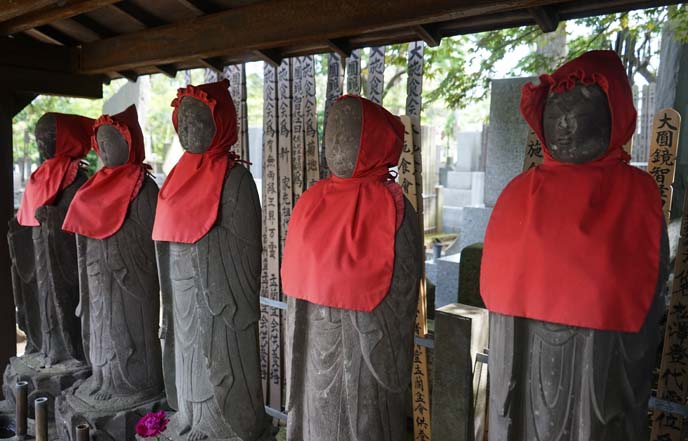
This row of Buddhist statues is dressed in red robes, giving an uncanny effect.
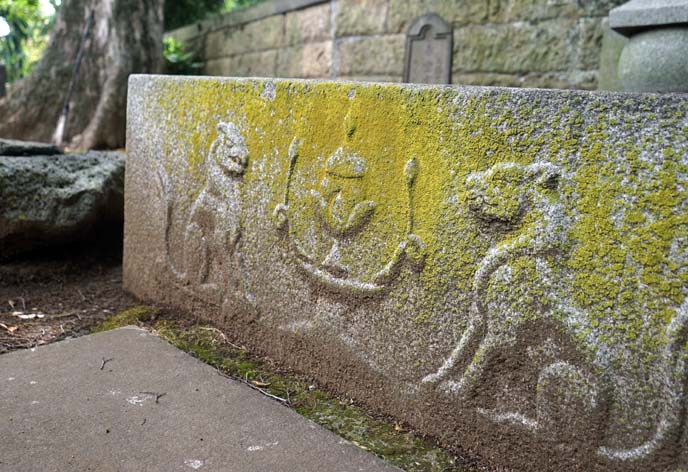
I spotted two moss-covered lions, on this headstone.
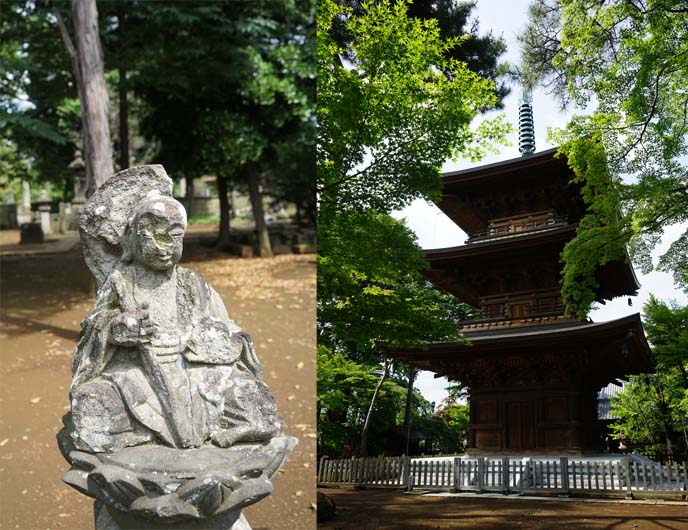
The magnificent three-tiered wooden pagoda forms the heart of the complex.
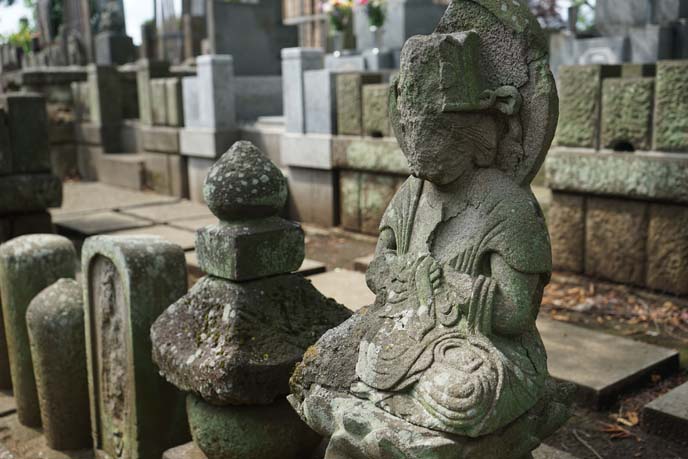
Some of the Buddha statues had been worn down over time, but remained beautiful.
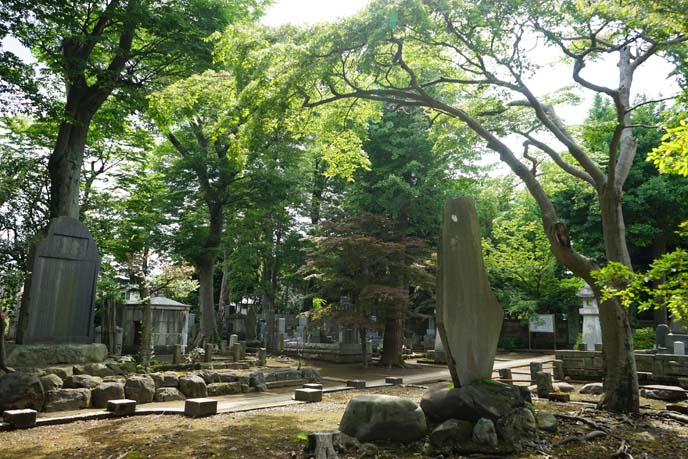
The garden is remarkable, with a Zen-like atmosphere. The stone paths are shaded by a canopy of trees such as gingko, maple and cherry.

I came to Gotokuji for the cats, but discovered the entire temple complex is like something out of a dream.

I encourage you to take a day trip to Gotokuji temple, and see the thousands of cats for yourself.

And don’t forget Imado Shrine, which you can combine with a visit to the Asakusa temple district.

Did you know the Japanese had cat temples? Had you heard of the traditions and stories of the maneki neko before?
SHARE & COMMENT

 LA CARMINA
LA CARMINA







28 Comments
Cat heaven!!
Truly.
I want to go so bad. Added to dream list.
I saw the catstatue in your apartment, I see where you got it now :)
yes!
Did you see the fox temple, did you see the fox temple?
Ahh not yet not yet…
Thanks for sharing, La Carmina!
Thanks, Alice!
I love this temple
Awwwww cute!!!!
:3
I can’t believe how many there were…
It’s one special place.
Wow I really need to visit, thanks for the information!
you must!!
By the way your Snapchat is omg so fun.
hah thanks! Morty!!!
Made my day.
YAY!
I love your photos! I went there too in 2008.
That’s great!
i enjoyed this one a lot!
I came here from your depop store. I had no idea you had such a wonderful job! This looks like a great trip :-)
Wow, thanks Lydia!! <3 If I can send you anything, email me any time. I'll be doing more Japan coverage soon too! <3
I love japanese temple. Omamori from temple is aivalable on http://www.omamori.com … I hope one day to return to Japan
OMG those lucky cats are so cute – I didn’t know that there was a temple just for them!
<3 it's such a special place!